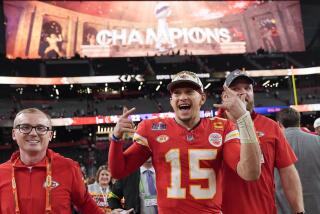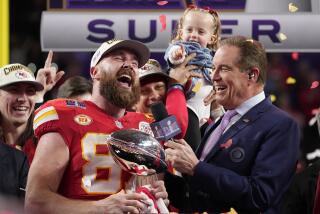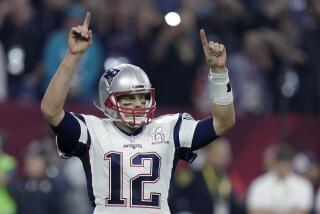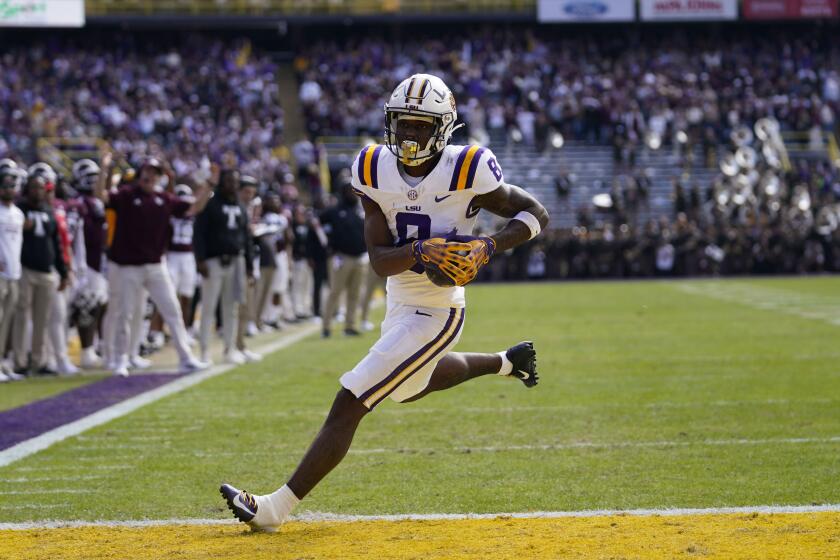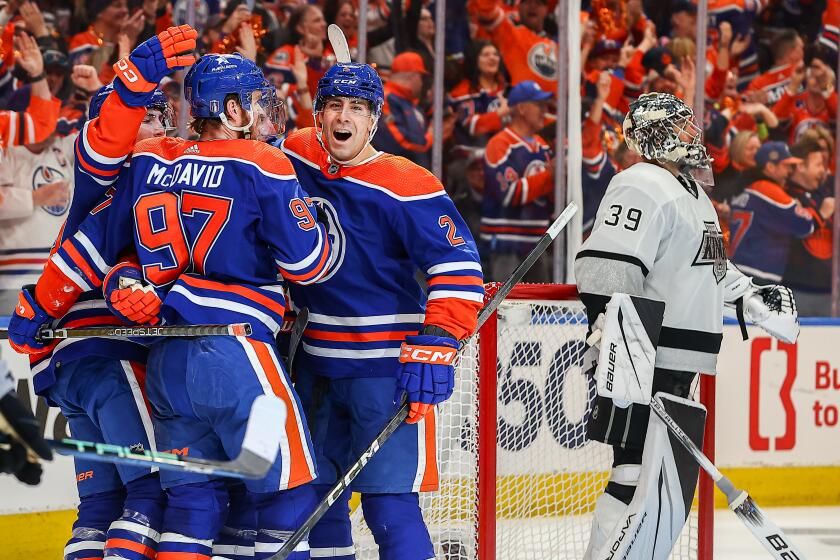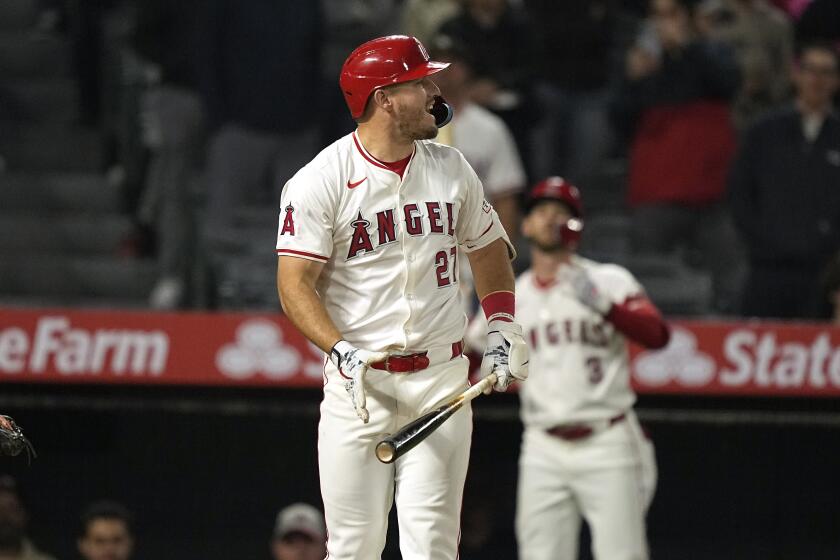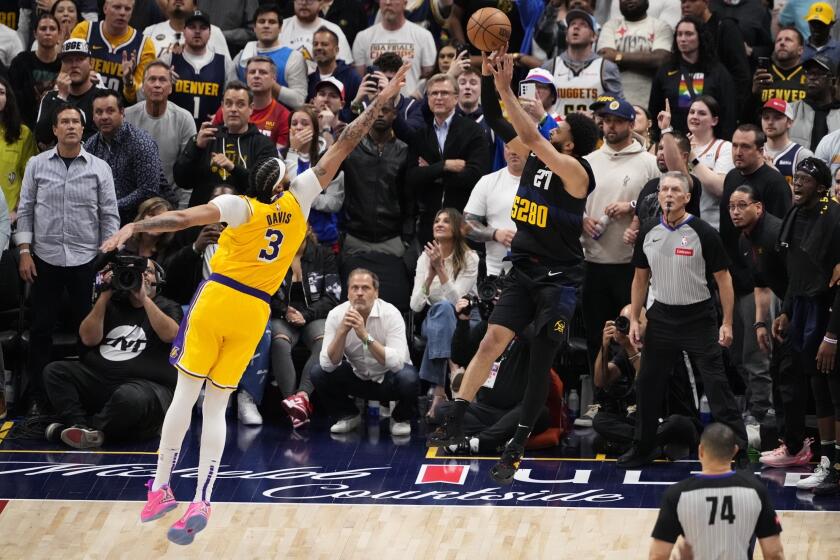Air Power
An NFL running team can still win regular-season games, a load of them, but the postseason belongs to passing teams, as it has with few exceptions for more than 20 years. Quarterbacks Tom Brady and Donovan McNabb proved that again this winter in advancing the New England Patriots and Philadelphia Eagles to the Feb. 6 Super Bowl. When the Patriots run, it’s for balance. The Eagles run for change of pace.
The losers in the conference finals Sunday were two determined running teams, the Pittsburgh Steelers and Atlanta Falcons, who rush the ball as a way of life. Of the nation’s 32 pro clubs, none is more renowned for running plays than Pittsburgh. And none of the others, even Pittsburgh, surpassed Atlanta this season in yards gained rushing.
On Sunday, accordingly, when the Steelers finally let passer Ben Roethlisberger pass, it was too late.
New England, the winner by 14 points (41-27), had taken a quick, early 14-point lead and never looked back.
Brady’s bombs, two perfect long passes, made the early difference (17-3) for the Patriots in Pittsburgh at a time when the Steelers were still doggedly running the ball. In Philadelphia, similarly, McNabb’s passing created an ultimate 17-point difference (27-10) as the Eagle defense held the Falcons to 99 yards rushing — an average of 33 yards apiece for Michael Vick, Warrick Dunn and T.J. Duckett. First to last: a triumph of air power.
Big Ben Beats Brady (for a Half)
THE STEELERS could now be on their way to Super Bowl XXXIX — and victory over cross-state Philadelphia — if their stodgy coaches had opened up earlier and told rookie quarterback Roethlisberger to play the first half (as well as the entire season) the way he played the second half Sunday against the Patriots.
As Roethlisberger’s team outscored Brady’s team in that second half, 24-17, Pittsburgh Coach Bill Cowher gave up on his dream of running his way into the Super Bowl and allowed his boy passer to pass. The result: Roethlisberger, who is not yet a year out of college (at Miami of Ohio), drove the Steelers to 17 points in his first three series of the second half, matching Brady’s 17-point output to begin the first half.
When a Pittsburgh field goal shortened New England’s once-commanding 24-3 lead to 31-20 — with all except two minutes of the fourth quarter yet to be played — all of New England was suddenly very afraid. But because Brady had been throwing the ball for three quarters to Roethlisberger’s one quarter, the Patriots were still 11 points ahead, and that was too much to make up, even for Roethlisberger, who out-passed Brady for the day, 226 yards to 207, each completing 14.
The country’s Roethlisberger-doubters are mysteriously still alive and well after a game in which he drove the Steelers five times to three touchdowns and two field goals — against Belichick’s beautifully designed Patriot defense — on a day when, half the time, Cowher thought the Steelers could run Jerome (The Bus) Bettis. Against Belichick! Considering Pittsburgh’s coaching strategy all year, Roethlisberger remains the NFL’s MVP.
McNabb a Better Quarterback than Vick
THE EAGLES won a duel of quarterbacks Sunday when McNabb out-ran Atlanta’s man Vick, 32 yards to 26, and out-passed him, 180 yards to 136. The difference between them is that the more mature McNabb is the more practiced technician against a heavy rush — and by far the better passer.
Vick, the fastest and most gifted of football’s running quarterbacks, hasn’t yet learned to run properly when rushed. He often leaves the pocket too soon, without moving around to evade the rush while waiting for a receiver to come open. And when pulling away from the pocket, he seems continually to be searching for a running lane instead of a receiver.
McNabb has mastered his role in all that. He best illustrated what a pro quarterback must do when, in the second quarter, on the big play of the game, he expected an angry blitz and got it on third and 11 at a time when the Eagle lead was only 7-3 midway through a 72-yard drive.
As the Falcons rushed at him from all directions, McNabb stepped this way and that while hanging in the pocket, fighting off tacklers while watching constantly for a target. Just before going down under the weight of what by now looked like half the Atlanta team, McNabb saw Eagle receiver Freddie Mitchell run free of a Falcon cornerback and dart toward the sideline. And at that instant, McNabb hit Mitchell for 12 yards and a first down.
On the next play, Philadelphia Coach Andy Reid made the call of the game. Figuring, correctly, on another blitz and single coverage, Reid asked McNabb to fire a 45-yard bomb against a big wind to tight end Chad Lewis, who was pulled down at the Atlanta 4. A moment later, on second and goal at the Atlanta 2, McNabb won the game with still another pass, reaching Lewis again, this time in the end zone.
Ideal Defenses for Predictable Offenses
THE DEFENSE that hamstrung Vick and Atlanta’s other runners, who for 17 weeks had been running over almost everybody, was the surprise of a strange Sunday to most sports fans (as well as to the Falcons). Basically, Philadelphia’s defensive coordinator Jim Johnson faced Vick with a two-zone (or two-level zone) defense that left a gap of 25 yards between the two zones.
This was a dramatic change from the defense Johnson had used only a week earlier to end the season for Minnesota’s quarterback Daunte Culpepper and receiver Randy Moss. That day, as usual, Johnson relied on a variety of blitzes and single coverages to confuse the Vikings.
This time he eliminated his trademark blitzing (except for an occasional run blitz) and defensed Vick the one way it can be done properly — with every defensive back face to face with Vick in a zone defense (ready for a run) instead of racing away from Vick in man-for-man coverages and reacting too slowly to his fast, brilliant scrambles.
Against Atlanta, in Johnson’s base defense, the five Eagles in the front zone backed a four-man rush to put nine men in the box, one of the first such defenses ever used. The object was to patrol every area where Vick could theoretically run. This year it was Vick’s scrambles (not his passes) that set up the whole Atlanta running game, the NFL’s most productive. And, hence, the key to stopping Atlanta was stopping Vick’s scrambling.
Far, far back in the secondary last Sunday, the Eagles presented a two-man deep-zone defense. The object was to cover every area that Vick could theoretically reach with a bomb. He has the arm if not the accuracy to hit any distant receiver.
What Vick can’t execute — and what the West Coast offense doesn’t feature in any case — are 15- to 20-yard passes — square-outs, turn-ins and crossing patterns. These require pin-point accuracy, which McNabb, Brady and Roethlisberger all have but not Vick. Accordingly, Johnson gave Vick 25 yards of uninhabited land between the Eagles’ two defensive zones where, in theory, he could make easy completions. In practice, he couldn’t.
In the Pittsburgh game, New England’s Coach Belichick, a defensive expert, and his defensive coordinator, Romeo Crennel, harassed Pittsburgh with multiple defenses. On first-down plays, understanding that Cowher would almost always run Bettis or Duce Staley, they filled the box with eight Patriots, denying Pittsburgh running room. On subsequent downs, the Patriots stood back and waited for Roethlisberger to throw or run, realizing and confronting precisely what Cowher hoped to do.
Rarely on such a big day of pro football have there been two such predictable offenses and workable defenses. In Pittsburgh, Cowher got over it eventually, if belatedly, and converted to passing. For Atlanta, Mora didn’t have that option. His quarterback is a runner not a passer, and runners can be defeated.
Brady vs. McNabb: The Super Bowl Key
THE SUPER BOWL will be won next month by the better quarterback, Brady or McNabb, or the better coach, Belichick or Reid. Or possibly even the better team, Patriots or Eagles, although, fundamentally, pro football is a game of quarterbacking and coaching. Experience often counts, and defense is also vital, but the best coach usually has the best defense.
Brady and McNabb are similar quarterbacks whose difference as passers is largely a reflection of the offensive systems their leaders prefer. On the Philadelphia team, Reid, a veteran offensive coach, favors West Coast football, which usually puts McNabb in short-pass formations.
Belichick, a convert to passing after a lifetime as a run-and-defense type, favors a more varied attack, which he can adjust from week to week. Just a week earlier, he had emphasized time-consuming short, safe throws integrated with power runs to keep Peyton Manning off the field.
In Pittsburgh, Belichick had a different problem and a different kind of opponent, whom the Patriots attacked in a different way.
The two passes Brady threw to get an early lead on the Steelers were probably comparable with the most accurately thrown long ones ever delivered. Each reached a target traveling at top speed straight down the field, directly away from the passer, the hardest kind to throw straight. The target was the same in both instances, wide receiver Deion Branch, who, as he turned, saw a moving ball that was speeding toward him neither high, low nor wide by more than an inch. All he had to do was pluck it.
Both Brady bombs were thrown on first down, when defensive players are seldom fully ready for a pass, not knowing until the last moment whether the play will develop as run or pass nor where it will go. So in part these plays were a tribute to the signal-caller, Patriot offensive coordinator Charlie Weis, the new Notre Dame football coach who never played for the Irish when he was a college student there some 20 years ago. Patriot fans worrying that Weis has been spreading himself too thin this winter can console themselves with his performance Sunday.
Thus, after a turnover, Brady’s first big pass came as a sudden shock on New England’s second offensive series of the game. Weis had set things up during the Patriots’ first series when he cautiously called three runs, then a discrete short pass and finally a field goal to notify the Steeler defense that nothing revolutionary seemed to be in the works. Abruptly, however, the next time the Patriots got the ball, Weis called the bomb.
On a 60-yard play, Branch was sprinting toward the end zone when he plucked it. And seven minutes into the first quarter, the Patriots had a 10-0 lead. Minutes later, after Brady bombed Branch again, this time for 45 yards, he passed to wide receiver David Givens nine yards away in the end zone, and the Patriots, up 17-3, owned the two-touchdown lead they would still have at the end.
In the other game last Sunday, McNabb’s quarterback contributions for Philadelphia were less spectacular but a great deal more meaningful. For, that day, McNabb was struggling under uncommon pressure. He was the leader of a group of distressed athletes who had lost the last three NFC title games, who had lost their greatest player (wide receiver Terrell Owens), who lacked a Dillon-type or Bettis-type back, who had lost face in one of the country’s most rabid sports communities, and who seemed to be falling apart in the third quarter — when they couldn’t score the sealing touchdown even after getting a turnover at the Atlanta 10-yard line — and all this on top of the pressures that had been on McNabb all his adult life.
On a spot like that, entering the fourth quarter of a close game, you or I would have had the shakes. But McNabb pulled himself together — after the nervousness of the third quarter — and in 12 trouble-free plays of the fourth quarter coolly drove the Eagles 65 yards to the touchdown they had to have. In third-down predicaments on that drive, he completed three of three passes, the third for the touchdown.
This has so far been McNabb’s best season. He has after all these years learned how to unload straight passes fast. And when the Eagle system permits, he can throw Brady-like bombs. A Super Bowl with McNabb vs. Brady? That could be some game.
More to Read
Get our high school sports newsletter
Prep Rally is devoted to the SoCal high school sports experience, bringing you scores, stories and a behind-the-scenes look at what makes prep sports so popular.
You may occasionally receive promotional content from the Los Angeles Times.
